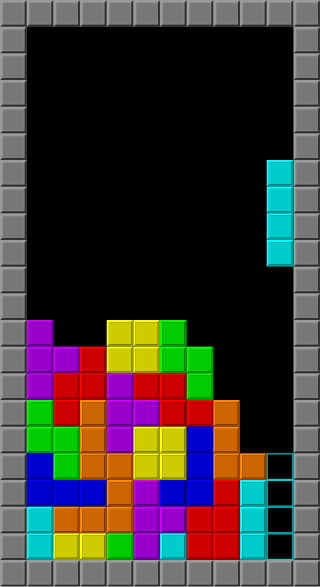
Tetris is a puzzle video game created by the Soviet software engineer Alexey Pajitnov in 1984. It has been published by several companies for multiple platforms, most prominently during a dispute over the appropriation of the rights in the late 1980s. After a significant period of publication by Nintendo, the rights reverted to Pajitnov in 1996, who co-founded the Tetris Company with Henk Rogers to manage licensing.

K.C. Munchkin!, released in Europe as Munchkin, is a maze game for the Magnavox Odyssey 2. Its North American title is an inside reference to then president of Philips Consumer Electronics, Kenneth C. Menkin.

A video game clone is either a video game or a video game console very similar to, or heavily inspired by, a previous popular game or console. Clones are typically made to take financial advantage of the popularity of the cloned game or system, but clones may also result from earnest attempts to create homages or expand on game mechanics from the original game. An additional motivation unique to the medium of games as software with limited compatibility, is the desire to port a simulacrum of a game to platforms that the original is unavailable for or unsatisfactorily implemented on.

The Tetris Company, Inc. (TTC) is the manager and licensor for the Tetris brand to third parties. It is based in Nevada and is owned by Tetris creator Alexey Pajitnov and Henk Rogers. The company is the exclusive licensee of Tetris Holding LLC, the company that owns Tetris rights worldwide.

Stern Electronics Inc. v. Kaufman, 669 F.2d 852, is a legal case in which the United States Court of Appeals Second Circuit held that Omni Video Games violated the copyright and trademark of Scramble, an arcade game marketed by Stern Electronics. The lawsuit was due to a trend of "knock-off" video games in the early 1980s, leading to one of the earliest findings of copyright infringement for a video game, and the first federal appellate court to recognize a video game as a copyrighted audiovisual work.

Midway Manufacturing Co. v. Artic International, Inc., 704 F.2d 1009, was a legal case where the United States Court of Appeals for the Seventh Circuit found that Artic violated Midway's copyright in their arcade games Pac-Man and Galaxian. The lawsuit was part of a trend of "knock-off" video games in the early 1980s, with courts recognizing that a video game can qualify for protection as a copyrighted audiovisual work.

Lewis Galoob Toys, Inc. v. Nintendo of America, Inc. is a 1992 legal case where the United States Court of Appeals for the Ninth Circuit concluded that there was no copyright infringement made by the Game Genie, a video game accessory that could alter the output of games for the Nintendo Entertainment System. The court determined that Galoob's Game Genie did not violate Nintendo's exclusive right to make derivative works of their games, because the Game Genie did not create a new permanent work. The court also found that the alterations produced by the Game Genie qualified as non-commercial fair use, and none of the alterations were supplanting demand for Nintendo's games.

Data East USA, Inc. v. Epyx, Inc. 862 F.2d 204, 9 U.S.P.Q.2d (BNA) 1322 was a court case between two video game manufacturers, where Data East claimed that their copyright in Karate Champ was infringed by World Karate Championship, a game created by Epyx. Data East released Karate Champ in arcades in 1984, and the game became a best-seller and pioneered the fighting game genre. The next year, Epyx published World Karate Championship for home computers, which sold 1.5 million copies. Data East sued Epyx, alleging that the game infringed on their copyright and trademark.

The Checking Integrated Circuit (CIC) is a lockout chip designed by Nintendo for the Nintendo Entertainment System (NES) video game console in 1985; the chip is part of a system known as 10NES, in which a 'key' is used by the 'lock' to both check if the game is authentic, and if the game is the same region as the console.

Triple Town is a freemium strategy puzzle video game with city-building elements. It is available for social networks and mobile devices and was developed by Seattle-based Spry Fox.
The Ville is a defunct game by Zynga released on June 30, 2012 in which the object was to earn experience points by building a house and talking with neighbors.
Fox Broadcasting Co. v. Dish Network, LLC is a copyright case in which the United States District Court for the Central District of California, by granting partial summary judgment, denied most parts of the copyright claims presented by Fox Broadcasting Company (Fox) against Dish Network (Dish) for its service, a DVR-like device that allowed users to record programming that could be accessed later through any Internet-connected device. The service offered by Dish also allowed users to record any or all Fox's prime-time programs and to automatically skips commercials (AutoHop).

Atari Games Corp. v. Nintendo of America Inc., 975 F.2d 832, is a U.S. legal case in which Atari Games engaged in copyright infringement by copying Nintendo's lock-out system, the 10NES. The 10NES was designed to prevent Nintendo's video game console, the Nintendo Entertainment System (NES), from playing unauthorized game cartridges. Atari, after unsuccessful attempts to reverse engineer the lock-out system, obtained an unauthorized copy of the source code from the United States Copyright Office and used it to create its 10NES replica, the Rabbit. Atari then sued Nintendo for unfair competition and copyright misuse, and Nintendo responded that Atari had engaged in unfair competition, copyright infringement, and patent infringement.
The protection of intellectual property (IP) of video games through copyright, patents, and trademarks, shares similar issues with the copyrightability of software as a relatively new area of IP law. The video game industry itself is built on the nature of reusing game concepts from prior games to create new gameplay styles but bounded by illegally direct cloning of existing games, and has made defining intellectual property protections difficult since it is not a fixed medium.
Shanghai MOONTON Technology Co. Ltd., commonly known as MOONTON Games, is a Chinese multinational video game developer and publisher owned by the Nuverse subsidiary of ByteDance and based in Shanghai, China. It is best known for the mobile multiplayer online battle arena (MOBA) game Mobile Legends: Bang Bang released in July 2016.

Tetris Holding, LLC v. Xio Interactive, Inc., 863 F.Supp.2d 394, was a 2012 American legal case related to copyright of video games, confirming that a game's look and feel can be protected under copyright law. Tetris Holding is a company that holds the copyright to the original Tetris game from 1984 and licenses those rights to game developers. Xio Interactive is a game developer that released Mino in 2009, a mobile game based on the gameplay of Tetris. Mino was downloaded millions of times, and Tetris Holding filed a DMCA notice and eventually a lawsuit against Xio for copyright infringement.

Capcom U.S.A. Inc. v. Data East Corp., 1994 WL 1751482 was a 1994 legal case related to the copyright of video games, where Capcom alleged that Data East's game Fighter's History infringed the copyright of Capcom's game Street Fighter II. It was revealed that the design documents for Fighter's History contained several references to Street Fighter II, leading Capcom to sue Data East for damages, as well as a preliminary injunction to stop the distribution of the infringing game. In spite of the intentional similarities between the two games, the court concluded that Data East did not infringe upon Capcom's copyright, as most of these similarities were not protected under copyright. Judge William H. Orrick Jr. applied a legal principle known as the merger doctrine, where courts will not grant copyright protection where it would effectively give someone a monopoly over an idea.

Atari, Inc. v. North American Philips Consumer Electronics Corp., 672 F.2d 607, is one of the first legal cases applying copyright law to video games, barring sales of the game K.C. Munchkin! for its similarities to Pac-Man. Atari had licensed the commercially successful arcade game Pac-Man from Namco and Midway, to produce a version for their Atari 2600 console. Around the same time, Philips created Munchkin as a similar maze-chase game, leading Atari to sue them for copyright infringement.

Atari Inc. v. Amusement World Inc., 547 F.Supp. 222 is a legal case in which the United States District Court for the District of Maryland held that Amusement World's arcade game Meteors did not violate Atari's copyright in their game Asteroids.















